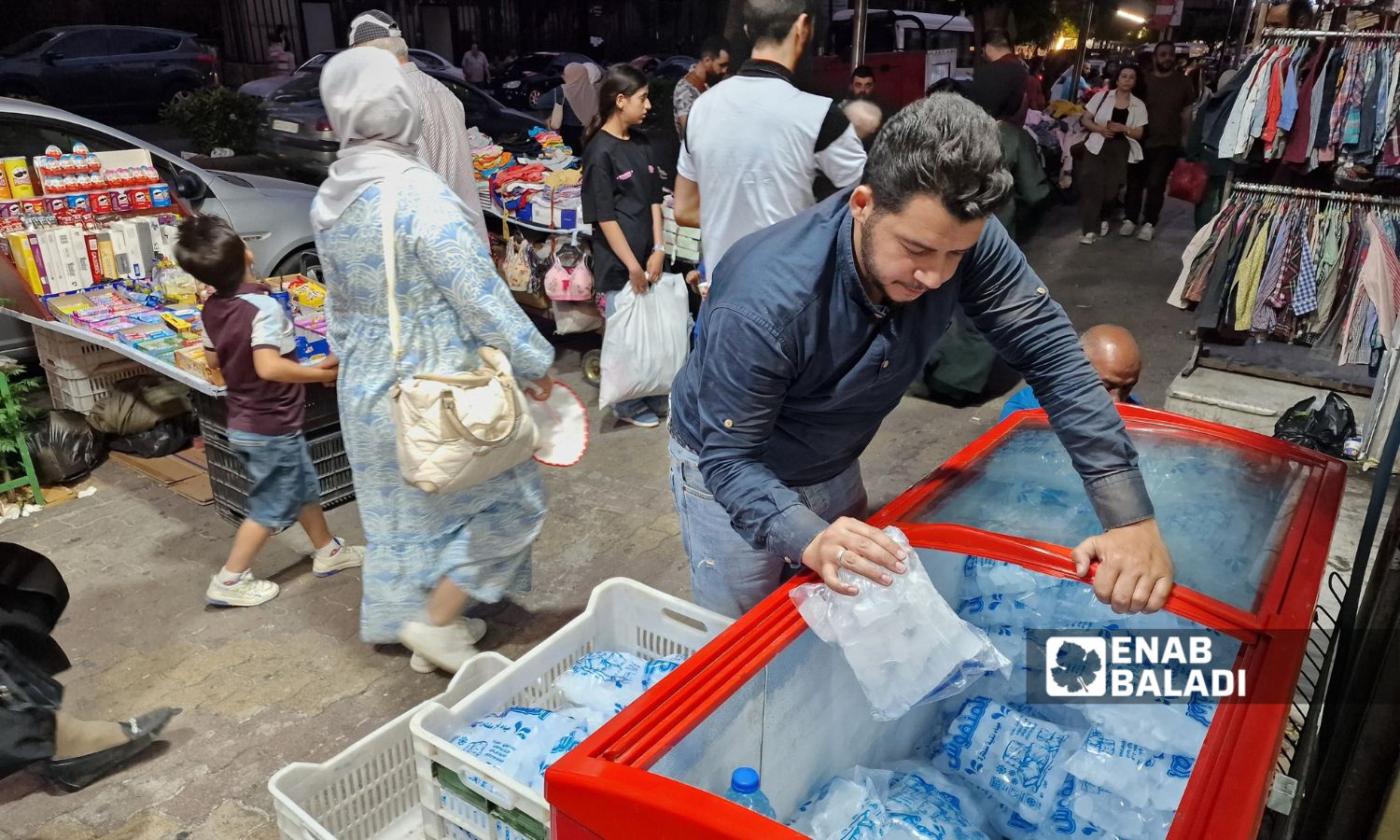Enab Baladi – Lama Diab
The need for citizens to purchase bags and blocks of ice is increasing due to rising temperatures and prolonged electricity cuts, necessitating the need to cool water, food, and beverages, which helps alleviate their daily suffering.
During a tour conducted by Enab Baladi to monitor ice prices in shops in Damascus and its suburbs, it was found that the price of a bag of ice ranges between 4,000 and 8,000 Syrian pounds.
What is striking is the absence of a registered trademark (brand) on the bags, or any production date and place.
As for ice blocks, the prices vary depending on the type of water used. For ice made from potable water such as al-Fijah, the price for a large block ranges between 5,000 and 7,000 Syrian pounds, while for the smaller size, the price of one piece of ice reaches 3,000 Syrian pounds.
On the other hand, ice made from water that may not be safe for drinking (well water) has a price range for the large size between 4,000 and 6,000 pounds, while the small size is priced at 3,000 pounds.
High temperatures and continuous rationing
Nima Midad, a street vendor, told Enab Baladi that she buys ice blocks from a factory in al-Adawi, Damascus, and then circulates them in her car in various areas of Damascus and its suburbs to earn a living.
She mentioned that the ice blocks she purchases are frozen from well water, and the factory owner told her that the extraction of al-Fijah water for ice-making has been banned due to the ongoing drought, according to her.
There is an increasing demand for purchasing ice blocks during this time due to rising temperatures and electricity outages, as Midad explained, noting that during her rounds in the streets of Damascus, she heads to parks and gathering places for citizens needing to buy ice to cool food and beverages.
For his part, Hassan al-Ahmad, the owner of an ice block factory in al-Zablatani, Damascus, explained to Enab Baladi that the water he uses to make ice blocks is either from al-Fijah potable water or from wells, and the latter can only be used to cool food.
He pointed out that there is currently a high demand for ice blocks due to rising temperatures and the beginning of summer on one hand, and the continued electricity rationing for long hours on the other. He clarified that citizens have no alternatives other than using ice to alleviate their long-standing suffering.
No oversight on factories
The lack of regulation over ice manufacturing factories raises concerns among citizens about the possibility that the water used may be contaminated and unsafe for drinking. However, they find themselves compelled to use alternatives to mitigate the rising temperatures.
The suffering of citizens resurfaces every summer as they seek cold water and to cool food amid prolonged electricity outages. This year is particularly critical due to high temperatures and drought, according to Abdul Razzaq Habza, secretary of the Consumer Protection Association, who spoke to Enab Baladi.
He added that the association previously communicated with the Ministry of Finance, Health, Domestic Trade, and Consumer Protection to monitor factories and sellers, as ice is susceptible to germs. “No one knows the source of the water used in making these blocks, and it is often well water.”
Habza mentioned that sellers are requested to separate the ice blocks designated for cooling from those suitable for drinking, and there should be set prices for sale by the Ministry of Economy, along with a label carrying the factory’s name, production date, and whether the ice is safe for consumption.
Additionally, he noted that the existing supply monitoring is insufficient to oversee markets across various sectors, with an inadequate number of personnel to cover the entire geography of Damascus and its suburbs. Furthermore, there should be regulation over factories and their workers to ensure their health safety.
Decreased electricity production
The Director of the General Authority for Electricity Transmission and Distribution, Khaled Abu Di, stated in a previous statement to Enab Baladi that the decrease in electricity supply hours in Damascus is due to reduced electricity production, caused by the cessation of Qatari gas supply, alongside increased demand due to rising temperatures, leading to more rationing.
He explained that two months ago, electricity supply reached six hours daily in some areas, and currently, it has decreased to three hours or less due to fuel shortages.
He attributed the fluctuations in rationing hours to distribution priorities based on the importance of areas (such as hospitals and vital facilities), in addition to differences in the infrastructure of the electrical grid between neighborhoods.
He indicated that the improvement of the electricity situation in Syria is primarily related to enhancing generation capacity, expediting agreements with Turkey, and starting the importation of gas and electricity.
On March 13, Qatar launched an initiative to supply Syria with natural gas via Jordan, to assist in generating electrical energy by providing two million cubic meters of natural gas daily.
Unregulated ice blocks selling in Damascus and its suburbs Enab Baladi.
Read More Details
Finally We wish PressBee provided you with enough information of ( Unregulated ice blocks selling in Damascus and its suburbs )
Also on site :
- NYT ‘Connections’ Hints and Answers Today, Tuesday, June 17
- Barbra Streisand Reveals Jaw-Dropping Details of Scandalous Proposal from Hollywood Icon!
- Today’s NYT ‘Strands’ Hints, Spangram and Answers for Tuesday, June 17

